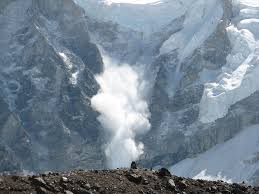Avalanche:

Three Army personnel, including two Agniveers, lost their lives recently in a major avalanche at the Siachen base camp in Ladakh.
- An avalanche is a large amount of snow that quickly moves down a slope.
- An avalanche can be deadly because it will bury or sweep away anything in its path.
- Large amounts of sliding rocks, earth, or other materials may also be called avalanches. But these are often known as landslides.
- Many different conditions make an avalanche possible.
- An avalanche is more likely to happen on a slope without trees or large rocks.
- These things help to keep snow in place.
- A weak layer of snow also makes an avalanche likely.
- Once the conditions are right, several things can start an avalanche.
- Heavy snowfall, strong wind, and rising temperatures all can loosen snow on a slope.
- Falling rocks or ice also can cause snow to slide.
- Even the movement of a skier, a snowboarder, or a snowmobile can trigger an avalanche.
- There are two main types of snow avalanches—sluffs and slabs.
- Sluff avalanches occur when the weak layer of a snowpack is on the top.
- A sluff is a small slide of dry, powdery snow that moves as a formless mass.
- Sluffs are much less dangerous than slab avalanches.
- A slab avalanche occurs when the weak layer lies lower down in a snowpack.
- This layer is covered with other layers of compressed snow.
- When the avalanche is triggered, the weak layer breaks off, pulling all the layers on top of it down the slope.
- These layers tumble and fall in a giant block, or slab.
- Avalanches vary in destructive power from harmless to large enough to destroy mature forests or flatten villages.
- When an avalanche stops, the snow becomes solid like concrete, and people are unable to dig out.
- People caught in avalanches can die from suffocation, trauma, or hypothermia.
- People in mountainous areas protect themselves from avalanches in several ways.
- Special fences help to hold snow in place.Barriers help to stop sliding snow or change its direction.
- Explosives help to clear snow from place where avalanches are likely to occur.




